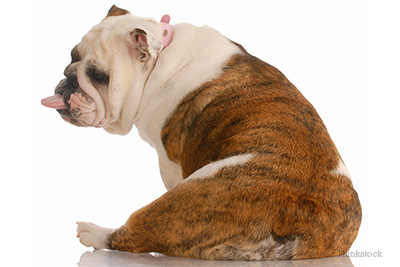
When dogs scoot their butts on the floor or grass, people often consider it a comical or embarrassing behavior as though the dog is doing it for pleasure. In reality, when dogs scoot, it is a sign of one thing: their bottoms are irritated or uncomfortable and they are trying to soothe the irritation.
Many pet guardians are under the mistaken impression that “scooting” is a response to pinworms (common in children); in reality there are a number of causes of scooting and pinworms are not one of them because dogs are not susceptible to pinworms.
Causes of floor scooting in dogs
Inflamed anal sacs— While causes of inflammation that result in scooting are extremely variable, probably the most common cause is inflamed anal sacs (sometimes incorrectly referred to as anal glands).
Anal sacs are small sacs on either side of the anus that have unknown functions, but probably play a role in marking territory. Ordinarily, these sacs empty when a dog has a bowel movement. If a dog fails to empty properly, he can become impacted and inflamed. Scooting behavior serves to empty these sacs or to soothe the associated discomfort. Left untreated these sacs can become severely infected.
Tapeworms— Though pinworms are not a factor in scooting, tapeworm segments can produce irritation that scooting may help relieve.
Matted Hair— Another cause of scooting can be matted hair and stools around the rectum. This can be a real concern in long hair dogs that are not groomed regularly. Stools accumulate in the hair and then catch more hair. Sanitation and cleanliness are the best ways to avoid this cause.
Allergies— Skin irritations associated with allergies can result in significant itching of an area.
All of these conditions can be treated and relieved by your veterinarian. If your dog is scooting more than just occasionally, see your veterinarian for a solution.
Diagnosing the causes of floor scooting in dogs
Tapeworms are simple to diagnose. The individual segments can be seen in the anal region and these worms can be easily treated with a widely available medication called prozequantal. Many guardians are tempted to try over the counter products, but these are not effective against tapeworms.
If your dog is scooting and you do not see tapeworm segments, it’s probably caused by anal sac inflammation. Your veterinarian will “express” or empty the sacs and possibly infuse them with an antibiotic/anti-inflamatory gel. Having your veterinarian or your groomer empty these sacs regularly can prevent more severe problems.
Questions to ask your veterinarian
- Why does my dog frequently drag his bottom across the living room carpet?
- My children have been diagnosed with pinworms. Should I have the dog treated?
If you have any questions or concerns, you should always visit or call your veterinarian -- they are your best resource to ensure the health and well-being of your pets.
